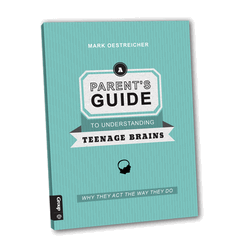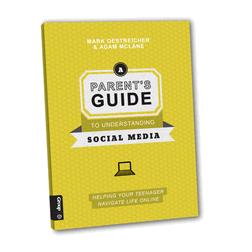 Mark Oestreicher – A Parent’s Guide To Understanding Teenage Brains
Mark Oestreicher – A Parent’s Guide To Understanding Teenage Brains
4.5 / 5
This book about teenage brains is part of a series of parent guides to help them understand different aspects about their teenage children. We’ve previously reviewed the books about teenage guys and social media.
All the other books in the series are co-authored, but this one has been solely written by Marko. It’s a great book and so I can highly recommend it for you and the parents of your youth to read.
What I Liked
Seeing as I’ve given it a 4.5 rating, I obviously liked a lot of it. Here are three things in particular that I liked about it though:
1. Parenting Goal
Early on in the book, Marko explains that the goal he and his wife had when raising their teenage children wasn’t for them to be happy, successful or unique, although those were obviously things they did desire for their children.
Rather, their goal was to raise an adult. When you look at your role as a parent from this perspective, it will change the way you treat your teen children in terms of the responsibility you give them.
2. Importance Of Responsibility
Following on from the previous point, Marko goes on to explore the importance of giving your child more responsibility. He explains that throughout their teenage years, their brain is developing. Many people see this as more of a reason to control young people as their brains aren’t developed enough for being responsible.
Marko makes an important point to counter this view though:
“…a teenager who is never given meaningful responsibility (meaningful is a key word there) can’t be expected to be responsible.”
Practice makes perfect, so if you don’t let your teenager practice responsibility, they’ll never be perfect 😉 Yes, they may fail, but let them “exercise” their brains so that this ability grows stronger.
3. Brain Neurons
Towards the end of the book, Marko mentions that a couple of years before puberty hits, the brain adds millions of additional neurons. A few years later though, the neurons which haven’t been used are lost.
This makes opportunities to be responsible in the early to mid-teen years so much more important, as this can be vital in forming neural pathways in the brain of young people. In the book, he advises that a researcher in to teenage brains believes that the brain is therefore hard-wired in the teenage years for how it’ll function when they’re an adult.
That being the case, what can you do in your youth work that gives teens more responsibility? Check out our post on youth participation that details 7 ways you can do this.
What I Didn’t Like
As mentioned above, this is the third of the Parent’s Guide books that I’ve read. All of them are quite short books and so the amount of information and advice they can fit in them is limited.
All three books have felt like there’s more that could be said on their respective subjects, but this book in particular feels like the ideas and advice could be fleshed out even more. Part of this is because Marko’s written several times on his blog about teenage brains, so it’s clear there’s even more that he could say on the subject; hopefully he’ll write a more in-depth book in the future.
Conclusion
All in all though, despite being shorter than I’d like, it’s a great book for learning more about teenage brains and how this can impact both parenting and youth work.
It gives practical advice on how to approach the way you deal with teenagers and is a positive look at their brain development, rather than the common negative media narrative of teenage brains being less developed and thus less capable.
Buy A Parent’s Guide To Understanding Teenage Brains
Don’t miss out on our book reviews (or any of our other posts) by:
- Signing up to receive our posts each day via email
- Following us on Twitter
- Liking us on Facebook
- Signing up to our RSS feed


 There are a couple of things we think you should check out today:
There are a couple of things we think you should check out today: